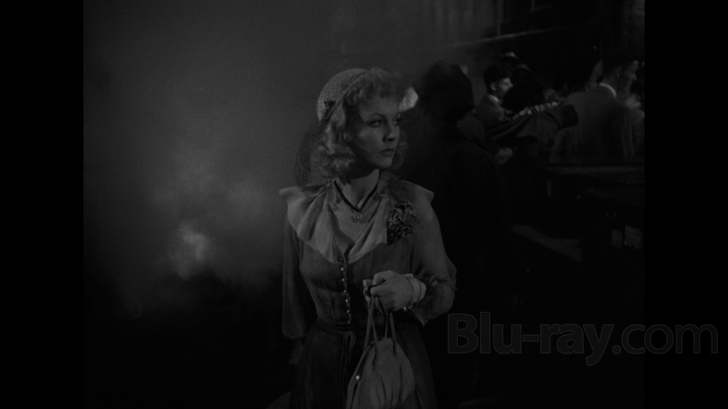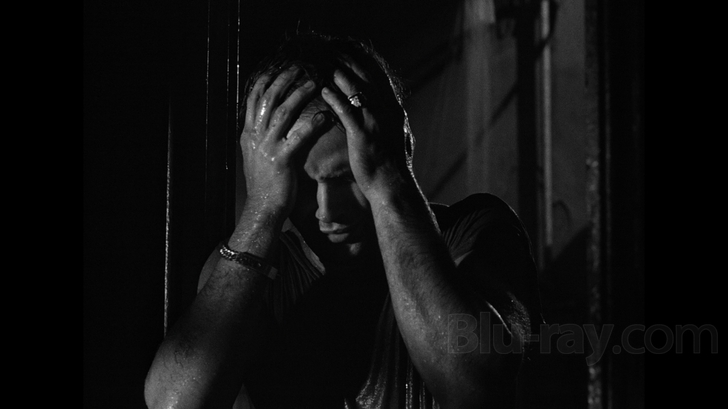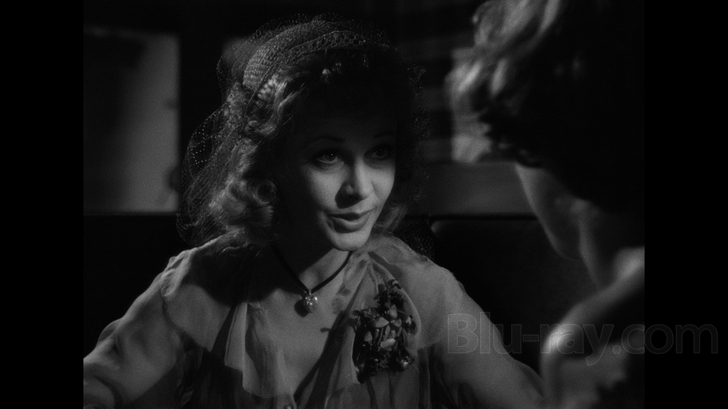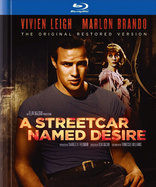A Streetcar Named Desire Blu-ray Movie
HomeA Streetcar Named Desire Blu-ray Movie 
60th Anniversary EditionWarner Bros. | 1951 | 125 min | Rated PG | Apr 10, 2012
Movie rating
8.1 | / 10 |
Blu-ray rating
| Users | 4.2 | |
| Reviewer | 4.5 | |
| Overall | 4.3 |
Overview
A Streetcar Named Desire (1951)
A neurotic belle struggles to hold on to her fading Southern gentility against the brutish badgering of her brother-in-law.
Starring: Vivien Leigh, Marlon Brando, Kim Hunter, Karl Malden, Rudy BondDirector: Elia Kazan
| Drama | 100% |
| Romance | 55% |
| Psychological thriller | 24% |
| Melodrama | 23% |
Specifications
Video
Video codec: MPEG-4 AVC
Video resolution: 1080p
Aspect ratio: 1.37:1
Original aspect ratio: 1.37:1
Audio
English: DTS-HD Master Audio Mono (48kHz, 24-bit)
French: Dolby Digital Mono
Spanish: Dolby Digital Mono
Italian: Dolby Digital Mono
Portuguese: Dolby Digital Mono
German: Dolby Digital Mono
Subtitles
English SDH, French, German, Italian, Portuguese, Spanish, Croatian, Danish, Dutch, Finnish, Greek, Hebrew, Mandarin (Traditional), Norwegian, Romanian, Slovenian, Swedish
Discs
50GB Blu-ray Disc
Single disc (1 BD)
Playback
Region free
Review
Rating summary
| Movie | 5.0 | |
| Video | 4.0 | |
| Audio | 4.0 | |
| Extras | 4.0 | |
| Overall | 4.5 |
A Streetcar Named Desire Blu-ray Movie Review
Stellar!
Reviewed by Jeffrey Kauffman March 30, 2012Younger audiences who only know Marlon Brando from his latter performances from, say, The Godfather on are apt to scratch their heads when confronted with appraisals of the actor that comment on his sheer physicality or in fact his matinee idol good looks. Marlon Brando? Well the fact is Brando indeed may not have aged extremely well, giving into certain indulgences which expanded his jowls and waistline, and other indulges which weirdly diminished his acting (at least in its visceral intensity if not in its craft). But audiences had never experienced a force of nature quite like Brando when he burst onto the screen in a series of early fifties films that quickly cemented his reputation as the leading male performer of his generation. Perhaps no finer example of Brando’s sheer physicality exists than his second film, the 1951 film version of A Streetcar Named Desire, the stage play that had made Brando a star on Broadway after a few years of supporting roles. Tennessee Williams’ follow up to The Glass Menagerie, the play that had made him an “overnight’ sensation, was another look into the unseemly underbelly of several Southern characters, only Williams wanted to push the envelope even further in terms of what dysfunctions he could both allude to and outright portray. The twisted triangle of Blanche DuBois (Vivien Leigh), her sister Stella (Kim Hunter) and Stella’s husband Stanley (Marlon Brando) is a seething portrait of barely controlled passion buried in various layers of self delusion and, in the case of Stanley, an almost atavistic violence.

For those unacquainted with A Streetcar Named Desire, the plot, such as it is, is rather minimal and serves mostly as a framework to support a handful of fascinating and unforgettable characters. The basic story is simplicity itself: Stella’s sister Blanche comes to stay with Stella and her husband Stanley at their squalid New Orleans apartment, an apartment which is arrived at on the iconic streetcar line named Desire. (As Rudy Behlmer discusses in his sections of the commentary included on this release, Tennessee Williams had been fascinated by the disparity of two streetcar lines which ran next to each other in New Orleans, one named Desire and the other titled Cemeteries. Toward the end of the film Blanche has a monologue where she talks about one way leading to desire and the other way leading to death.) What’s really important here is what Blanche’s arrival does to the fragile domestic environment of Stella and Stanley, as well as what secrets in everyone’s past are revealed as their interactions evolve over the course of the drama.
Williams works much of the same Southern Gothic territory in A Streetcar Named Desire that he did in The Glass Menagerie, and indeed there are more than passing similarities between Blanche DuBois and Menagerie’s Amanda Wingfield. Both are faded (or at least fading, as Blanche describes herself) Southern Belles, both have had disastrous marriages, and both are wrapped in a certain amount of denial and desperation. Of course Blanche is in reality a completely different formulation of a type that Williams would return to over and over in his career, and her back story becomes more and more troubling as Streetcar slowly uncovers her lies and her real motivations for leaving her home town of Auriol and traveling to visit her sister Stella. The arrival of a gentleman caller named Mitch (Karl Malden) highlights Blanche’s insecurities, especially with regard to her age, but also her duplicitousness and proclivity toward scheming. In a masterful performance by Vivien Leigh, Blanche becomes in a very real way the “flip side” of Scarlett O’Hara, a once winsome head turner who attempts to achieve her romantic dreams by batting her eyes while continually putting off until tomorrow things that really should be handled today.
Playing off of Blanche’s “is she or isn’t she” demureness is the troubling relationship between Stella and Stanley. Years before anyone ever talked about anything like domestic abuse, Williams had created one of the most visceral characters in all of American theater history in Stanley Kowalski, a troubled, turbulent man with a barely controlled temper which erupts in sudden bursts of violence at several points throughout the drama. Surprisingly, Stella isn’t all that concerned about it, perhaps a sign of what would later be termed Stockholm Syndrome, but as she herself confides to Blanche after one of Stanley’s little contretemps, his bursts of temper and violence “kind of thrill” her. She’s a willing coconspirator in this family dysfunction, one which spirals completely out of control as the film careens headlong to its climax, a climax only partially blindsided by a tacked on coda that was not part of Williams’ original conception. What's fascinating about Stanley both in Williams writing but perhaps more exceptionally in Brando's performance is how vulnerable the character is despite his brutishness. Brando doesn't just wear his heart on his sleeve here, he seems to bare his very soul.
Streetcar may strike some younger viewers as an odd film. It has no real plot mechanics and is instead a very intimate and at times disturbing (and even depressing) character study. But this is a film that is a virtual textbook of acting, at least the school of acting that was espoused by the Group Theater and then spread to subsequent generations through the mentorship of such icons as Stella Adler and Lee Strasberg. Some of these techniques have become much parodied and even derided, but after a couple of decades of more arch and surface oriented acting styles, the early adherents of Stanislavski and “The Method” brought something viscerally real and heretofore never experienced (or at least rarely experienced) in American cinema. Director Elia Kazan, who cut his professional teeth with The Group in the 1930s, brings a sure sense of what each performance needs to accomplish. His direction is unobtrusive but similarly inescapable. He builds the drama to its potent conclusion by slowly adding small moments of character revelation which ultimately explode in a cascading series of tumultuous events. Kazan also with his DP Harry Stradling beautifully crafts a dark and fetid ambience while at the same time very subtly using the camera to highlight dramatic effect (pay close attention to the famous “torn t-shirt” scene with Brando and Hunter for a sterling example).
Tennessee Williams was obviously haunted by certain aspects of his own life and upbringing, ghosts which he revisited time and again in his plays and screenplays. A Streetcar Named Desire is a potent distillation of some of these spectral entities which flitted about Williams’ psyche, personified in a quartet of characters who are each involved in their own individual desperate dance, both with their inner demons as well as with their ostensible partners (and those partners’ demons). This is a moody, dank drama that features some of the most legendary performances in American film. Many people point to Kazan’s On the Waterfront as his best film, which may in fact be true (at least in terms of overall impact), but he never did finer work with actors than in A Streetcar Named Desire.
A Streetcar Named Desire Blu-ray Movie, Video Quality 

A Streetcar Named Desire is presented on Blu-ray courtesy of Warner Brothers with an AVC encoded 1080p transfer in 1.37:1. We have become used to near flawless transfers of catalog titles by Warner Brothers and so anything less than perfection might unreasonably disappoint some videophiles. This is yet another excellent high definition presentation culled from largely damage free elements that offers lustrous contrast that really shows off the deep chiaroscuro ambience that Kazan and legendary cinematographer Harry Stradling were exploiting. Fine detail is often exceptional, but it's the play of light against shadow that is the most impressive thing about this transfer. All of this said, a lot of Streetcar just doesn't quite pop with the amazing sharpness and clarity that has graced some of the other vintage Warner catalog titles released over the past couple of years. The image seems just slightly more soft and diffuse than some other films of similar vintage that we've seen on Blu-ray from Warner. This is a matter of degree, so no one should be overly concerned about what may in fact be niggling concerns, and it's doubtful anyone is going to be anything less than satisfied with this presentation.
A Streetcar Named Desire Blu-ray Movie, Audio Quality 

A Streetcar Named Desire is granted a lossless DTS-HD Master Audio Mono track that wisely decides not to repurpose the film's claustrophobic sonic content with a faux surround mix. Dialogue is sharp, clear and very precisely presented and the fabulous Alex North score, full of bluesy riffs and occasionally bombastic brass motifs, sounds absolutely fantastic. While the sound here is obviously narrow, and not especially full, there is no actual clipping of either high or low frequencies, and the overall effect is completely satisfactory when placed in the film's historical context.
A Streetcar Named Desire Blu-ray Movie, Special Features and Extras 

- Commentary features supplements producer Laurent Bouzereau hosting (edited) comments from co- star Karl Malden and historians Rudy Behlmer and Jeff Young. Young got to know Kazan quite well when Young was an executive Paramount and has some good anecdotes about the director. Behlmer contributes more of an overall historical perspective and Malden is able to give an actor's viewpoint, on both the stage and screen versions. Some of Malden's comments about Brando in his early career are quite surprising, and there are some wonderful anecdotes shared about the original Broadway run, including some great stories about "mother hen", original star Jessica Tandy. This is an extremely worthwhile and informative piece that should appeal equally to scholars and fans alike.
- Elia Kazan: A Director's Journey (SD; 1:15:32) is the largely superb documentary which aired on PBS a few years ago. Narrated by Eli Wallach, this takes a chronological look at Kazan's career, including a brief overview of his early Broadway career and nascent acting roles, the bulk of this Richard Schickel written and directed piece simply goes from major film and Broadway play to the next, with Kazan offering his own commentary. While this piece touches on Kazan's infamous testimony before HUAC, it really glosses over its impact and negative repercussions for several former Kazan friends and collaborators, and remains this documentary's major failure in an otherwise excellent approach.
- A Streetcar on Broadway (SD; 22:01) is another interesting piece featuring a wealth of Kazan commentary, this time focusing on the original Broadway version of the play.
- A Streetcar in Hollywood (SD; 28:10) once again has the benefit of Kazan's own reminiscences, as he discusses the way the play had to be changed and adapted for its film version.
- Censorship and Desire (SD; 16:21) has Rudy Behlmer talking about how timid the Hollywood powers that be were about even optioning the play for a film version, and then the changes they had to make in order to get the project completed.
- North and the Music of the South (SD; 9:14) is a nice profile of composer Alex North.
- An Actor Named Brando (SD; 8:53) is a brief look at the legendary actor.
- Marlon Brando Screen Test (SD; 5:06) is a fascinating look at the actor. This has some fairly substantial sound issues at the beginning.
- Outtakes (SD; 15:38)
- Audio Outtakes (17:01)
- Trailers includes Warner Brothers 1951 (SD; 2:35), 20th Century Fox 1958 Reissue (SD; 2:09) and United Artists 1970 Reissue (SD; 1:50).
- Digibook Packaging with glossy pages including photos and text.
A Streetcar Named Desire Blu-ray Movie, Overall Score and Recommendation 

A Streetcar Named Desire has lost little if any of its impact in the 60 years since its original release. Though the film had to make several rather substantial changes from the original play to get by the censors, overall the film rather adeptly alludes to pretty much everything Williams was getting at, if perhaps in a slightly more circumspect way than in the original stage version. (This Blu-ray presents the restored version of the film which was previously released on DVD and which includes several snippets excised from the original release.) Younger audience who can't quite understand what the fuss ever was over Marlon Brando may be awestruck by the intense physicality of the actor at this early stage in his career, and the performances of Leigh, Hunter and Malden (all of whom won well deserved Oscars) are the stuff of legend. This new Blu-ray does a film classic proud, with excellent video and audio and a wealth of supplementary material. Highly recommended.
Other editions
A Streetcar Named Desire: Other Editions
Similar titles
Similar titles you might also like

Grand Hotel
1932

Mrs. Miniver
1942

The Scarlet Empress
1934

Revolutionary Road
2008

Reflections in a Golden Eye
Warner Archive Collection
1967

Lolita
1962

Casablanca 4K
80th Anniversary Edition
1942

Weekend
2011

Fedora
1978

Black Swan
2010

Disobedience
2017

My Beautiful Laundrette
1985

Sunday Bloody Sunday
1971

Under Capricorn
1949

Texasville
1990

From the Terrace
Limited Edition to 3000
1960

Laurence Anyways
2012

Last Tango in Paris
Ultimo tango a Parigi | Uncut Version
1972

All That Heaven Allows
1955

Call Me by Your Name
2017

